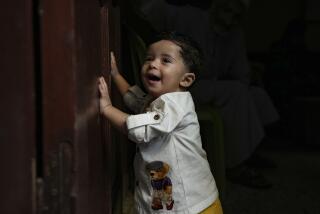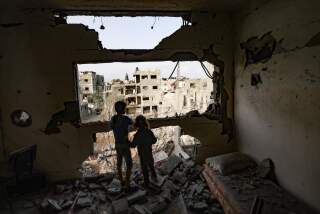Kidnapped to Be a Camel Racer
- Share via
DHAKA, Bangladesh — Ali Islam has a nasty scar along his deformed right arm from the days when he was a jockey racing camels.
He’s retired now -- at age 10.
His sad eyes have seen a side of the world known to hundreds of poor Bangladeshi children every year: Ali was abducted from home and sold into illicit labor far away.
Ali’s journey started in 1998. He was playing at a river ferry terminal in Dhaka, the Bangladeshi capital, where his poor family ekes out a living as migrant workers. He dozed off for a nap.
“The next thing I remember is waking up in a dark room,” Ali recalled in an interview. There, he met a man named Yunus and a woman called Ashia who took him for a bus ride. At a border crossing, the couple passed Ali off as their son.
When the journey stopped, Ali remembers seeing mountains for the first time. The bus had driven out of his home in South Asia and crossed a portion of eastern India before arriving in Katmandu, the capital of Nepal at the base of the Himalayas.
After several months in Nepal, Ali was taken aside by a Bangladeshi man and ordered to call the man “father.” The two boarded a plane and ended up in Dubai in the United Arab Emirates. The child had no travel documents; Ali’s name was entered in the man’s passport as his son.
“After leaving Dubai airport, [he] handed me to an Arab man,” Ali said. He watched the two men exchange money.
“The man took me to the desert and put me on a camel,” said Ali, who had never seen a camel before. “This man said something in Arabic and the camel started running. I was terrified and screamed.”
The 6-year-old boy was now a jockey in a Persian Gulf desert.
Ali had to race camels twice a week for the next two years, competing against other young riders, most from Bangladesh and Pakistan.
Camel races are immensely popular in the Persian Gulf. Although the United Arab Emirates banned the use of child jockeys in 1993, the law is openly ignored, with even televised races showing small boys riding the huge beasts.
The boys, who are favored as jockeys because they are light, ride bareback or are strapped to the camels’ backs. Some trainers say they attach Velcro to the saddles and to the boys’ pants to keep them in place.
Ali was forced to continue racing -- until he grew too big. When Ali tipped the scales at 33 pounds, he had to work as a groom.
During one feeding session, a camel bit Ali’s right arm near the wrist. The bite was so deep it severed nerves and left his flesh hanging from the bone. It took months for the wound to close, but it never properly healed. Ali has not regained strength in his right hand.
In May, after a year and a half as a groom, Ali was deemed no longer useful. He was given a plane ticket to Dhaka, some pocket money and the promise that four years of back wages would be wired to his parents, then was dropped off outside the Bangladesh Embassy in Dubai.
Back in Bangladesh, authorities placed the boy with the Bangladesh National Women Lawyers Assn., a human rights and legal aid group. It arranged a reunion with his emotional parents.
“When he didn’t come home that night, we looked everywhere. We looked for two years, but then gave up,” Abdul Latif said of his son, the youngest of eight children.
“I used to cry and pray,” said his mother, Halima. “I thought he’d fallen into the river and drowned.”
Ali’s father hopes to send the boy to school so he can learn a trade. The family never got any money from the boy’s employers in Dubai.
“He has lost power in his right hand,” Latif said. “He can’t do much, but he has to have a future.”
Despite tough laws against human trafficking, which carries the death penalty, hundreds of Bangladeshi children are kidnapped every year, humanitarian groups say. Abducted girls often end up in brothels in India and Pakistan; the boys mostly are taken to the Persian Gulf to race camels.
Abdur Rahman Bichu, who was charged with trafficking children like Ali, was arrested in January near a bus terminal in Dhaka for possession of forged travel documents.
The lawyers’ association has filed complaints against two other people based on Ali’s accounts. Bichu’s case is not one of them, but it is similar.
Bichu ran an employment agency in the town of Dhala, which advertised jobs for Bangladeshis in the Middle East.
Sohel Ahmed, a villager from Dhala, said he sold family land and property to pay Bichu for finding him a job in Dubai. Ahmed said he was told to travel to the Middle East via Nepal. His story was similar to Ali’s.
Sohel said that when he arrived, he was given a child to take along to Dubai. He was told to instruct the child to call him “Baba,” Bengali for “father.”
“I realized I had gotten myself involved with a child-trafficking gang,” said Ahmed, one of several people scheduled to testify against Bichu. “I got scared and said no.”
Not everyone does. This is a country where more than 40% of the people live below the poverty line and 35% are unemployed, so a payoff from trafficking can be alluring.
The most popular child-trafficking route out of Bangladesh is the one that Ali described: over the loosely policed frontier with India’s northeastern Assam or Tripura states, then overland to Katmandu for a flight to the Middle East.
“It’s easy to get a visa to Nepal,” said Salma Ali at the Bangladesh National Women Lawyers Assn. “And nobody cares in Katmandu how many Bangladeshis fly from there to the Middle East.”
More to Read
Sign up for Essential California
The most important California stories and recommendations in your inbox every morning.
You may occasionally receive promotional content from the Los Angeles Times.













